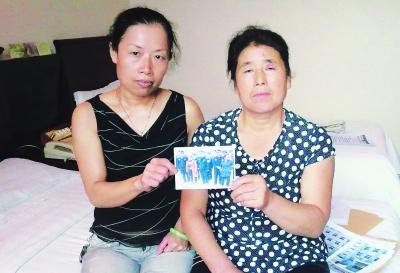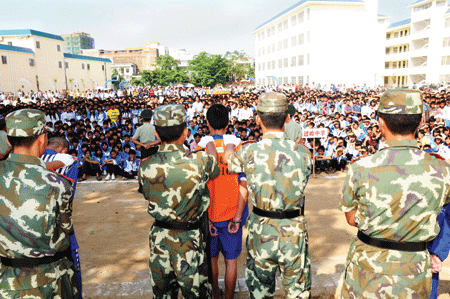Shaanxi disgraces itself by 'shaming' petitioner
Never for one moment did Duan Dingmei, a 42-year-old villager from Fuping county, Weinan, Shaanxi Province, believe her attempt to petition authorities in Beijing would yield any results. But neither could she have imagined that her efforts would end in humiliation at the hands of police in a public square in front of thousands of people.
 |
|
Two women kept the picture showing that they were held tightly by policemen and forced to face an audience of up to 10,000 people. |
After becoming embroiled in a dispute with local authorities eight months ago, like so many before her, Duan decided to come to the capital to seek justice. Just as she expected, police sent her back home. But when she arrived, she was immediately hustled onto a stage in a public square where a large group of villagers had already gathered.
She quickly realized that this was a tactic used by the authorities to humiliate her once she heard that the gathering had been convened as "public treatment for illegal petitioning."
"I was pushed by two policemen up the small stage in front of the square, which was full of people," Duan told the Global Times. "When they read out my so-called illegal behavior of petitioning, I tried so hard to keep my head up, but I could not help feeling so ashamed that I thought I really was a criminal who had committed a serious crime."
To make the humiliation even worse, authorities allowed local television stations to film the gathering.
|
A public parade of criminals is held in Sanya, Hainan Province. The assembly was attended by thousands of people, including students. Two criminals were taken away to be executed after the assembly. |
Rough justice
While authorities at the central level say they have been trying to improve the legal system and protect the dignity of suspects in recent years, local authorities sometimes still resort to a more populist form of justice, on occasions skipping the judicial process altogether.
On Tuesday, 17 men and women in Ankang, Shaanxi Province were forced to march in front of thousands of farmers. The large wooden signs hung around their necks displayed their names and the crimes they were suspected of committing - sabotaging a public construction project and disturbing social order.
Many citizens accused the local government of human rights violations.
That scene reminded Duan of her own humiliation.
"I just thought of the Cultural Revolution (1966 - 76) when I was humiliated," Duan said, referring to ugly scenes common to that time of people who had been accused of wrongdoing being publicly paraded and harangued by large crowds.
To this day, Duan feels she is being watched whenever she walks along the streets, and does not dare go out.
 0
0 







